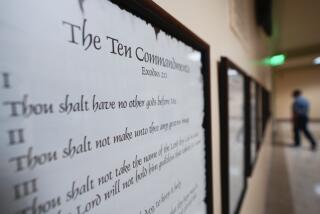An atheism debate writ large, on billboards
- Share via
In the Internet age, the nation’s culture wars are often waged through online blogs and e-mails. But across North Carolina, a heated church-state debate is playing out on an old-fashioned canvas: highway billboards.
An atheist group has erected six billboards with the phrase “One Nation Indivisible,” leaving the words “Under God,” from the Pledge of Allegiance.
Outraged, a church group has responded by putting up a dozen billboards featuring the phrase “One Nation Under God.”
The dueling billboards have stirred up a long-simmering debate in this Bible Belt state over just what the Founding Fathers intended when they prohibited the establishment of government-endorsed religion. The 1st Amendment to the Constitution reads, in part: “Congress shall make no law respecting an establishment of religion.”
Jennifer Lovejoy, a retired Army noncommissioned officer and an atheist, says the Constitution bans the type of prescribed religion reflected in the “Under God” phrase in the pledge.
“The Founding Fathers were adamant about separation of church and state. Many of them feared God, but they feared religion more,” said Lovejoy, an Asheville resident and a member of Western North Carolina Atheists, part of the North Carolina Secular Assn., which raised money for the billboards.
The “One Nation Indivisible” billboards went up just before the July 4 weekend in Asheville and five other North Carolina cities along the Interstate 40 and Interstate 85 corridors.
The Rev. Ralph Sexton Jr., pastor of Trinity Baptist Church in Asheville, was offended. The Asheville billboard was near his church — and not far from the Billy Graham Freeway.
Sexton and other church leaders, under the banner of a coalition called We Still Pray, raised money for the “One Nation Under God” billboards to counter what Sexton calls “political correctness gone amok.” The billboards were erected in the same six cities and will remain for at least another month.
“We were established as a Christian nation, so don’t try to rewrite history and sanitize it to write out God,” Sexton said.
Lovejoy said it’s the church group that’s rewriting history. She points out that the original pledge did not contain “under God” when it was written in 1892 by a Baptist minister, Francis Bellamy. The phrase was added by Congress in 1954 at the height of the Cold War against the communist Soviet Union.
“Her problem is that she doesn’t know American history,” Sexton said of Lovejoy. He contends that the pledge has religious underpinnings.
He insists that the Constitution seeks to protect religion from government interference but does not ban religion in government.
“We are a nation built on Christian principles,” Sexton said. “Our Founding Fathers intended not that God be out of government, but that the government stay out of the church.”
Lovejoy, the wife of a retired military policeman who is also an atheist, said her group’s billboards were in response to a controversy in Asheville in December, when a city councilman refused to obey an obscure provision in the North Carolina Constitution that disqualifies public officeholders “who shall deny the being of Almighty God.” The councilman, Cecil Bothwell, is an atheist.
When he was sworn in to office, Bothwell recited an alternative oath that did not involve affirming a belief in God or swearing on a Bible. State religious tests for officeholders were ruled unconstitutional by the U.S. Supreme Court in 1961.
Lovejoy said she was also motivated by a Baptist minister who held Bible studies and prayer sessions for a high school football team that included her sons, who do not consider themselves Christians.
Sexton said his We Still Pray group was formed in 2000 to protest a court ruling that prohibited student-led prayer in public schools. The group held a prayer rally at an Asheville high school.
The atheist group’s billboard on the Billy Graham Parkway in Charlotte was defaced by someone who painted in the words “under God” below “One Nation Indivisible.”
Other than that incident — and a few blogs and online news site comment sections peppered with obscenities and insults — the billboard debate has remained civil.
“The good part of all of this,” Sexton said, “is that we’re talking to each other about an important issue.”
More to Read
Sign up for Essential California
The most important California stories and recommendations in your inbox every morning.
You may occasionally receive promotional content from the Los Angeles Times.











